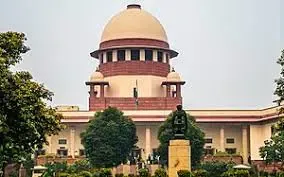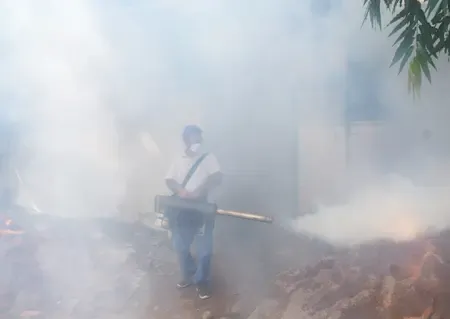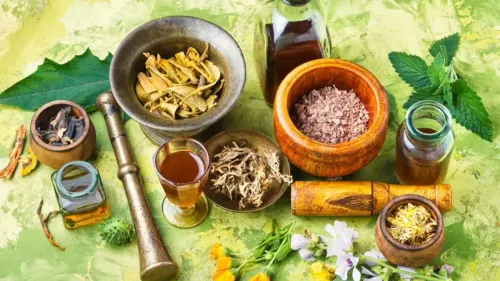Did the SC Dismiss a PIL Regarding Child Deaths Linked to Toxic Cough Syrup?

Synopsis
Key Takeaways
- Supreme Court dismisses PIL regarding child deaths.
- Contaminated cough syrup linked to fatalities in Madhya Pradesh and Maharashtra.
- NHRC calls for investigations into drug safety.
- Allegations point to regulatory failures in drug oversight.
- Need for systemic reforms in pharmaceutical regulations.
New Delhi, Oct 10 (NationPress) The Supreme Court on Friday rejected a public interest litigation (PIL) that called for an in-depth investigation into the fatalities of children allegedly due to the intake of contaminated cough syrup in Madhya Pradesh and Maharashtra.
A bench led by Chief Justice of India (CJI) B.R. Gavai and Justice K. Vinod Chandran probed advocate Vishal Tiwari, the petitioner, about his prior PIL filings. Upon hearing Tiwari mention “8-10 PILs,” the CJI Gavai-led bench dismissed the case.
During the session, Solicitor General Tushar Mehta, the second-highest legal officer of the Centre, present in court but not advocating for any respondent, asserted that state governments—including Tamil Nadu and Madhya Pradesh—were taking appropriate actions.
“States like Tamil Nadu and Madhya Pradesh will take measures. We cannot simply distrust them. They will certainly act,” Mehta remarked.
The PIL alleged that at least 14 children had succumbed since early September, predominantly from Nagpur in Maharashtra and Chhindwara in Madhya Pradesh. The claim noted that laboratory tests by the Madhya Pradesh government confirmed the presence of Diethylene Glycol (DEG)—a hazardous industrial solvent banned for pharmaceutical purposes—in 'Coldrif Cough Syrup' produced by Sresan Pharma Pvt. Ltd. from Tamil Nadu.
It highlighted that initial cases arose from Chhindwara district in early September, and fatalities escalated with similar cases reported from Nagpur shortly thereafter.
“Despite these alarming discoveries, the Union Government and the Central Drugs Standard Control Organisation (CDSCO) reportedly failed to promptly issue a national recall or prohibition, allowing potentially harmful medications to remain on the market,” the plea alleged.
It drew comparisons with incidents in The Gambia and Uzbekistan, where DEG-tainted Indian syrups were associated with over 90 child deaths abroad. “This is not an unfortunate coincidence but a result of negligence, indifference, and regulatory inadequacies—an institutional decay that permits counterfeit and adulterated drugs to infiltrate the market unchecked,” the PIL asserted.
The plea requested the formation of a National Judicial Commission or Expert Committee, led by a retired Supreme Court judge, to conduct a thorough investigation into the production, regulation, testing, and distribution of tainted syrups and to suggest significant drug-safety reforms. Additionally, it called for a Central Bureau of Investigation (CBI) inquiry into the child fatalities across states, supervised by a former apex court judge.
The PIL also urged the Supreme Court to transfer all ongoing FIRs related to the deaths to the CBI to ensure a consistent and impartial investigation. Another request was for the immediate recall, confiscation, and prohibition of all batches of Coldrif Cough Syrup and related formulations manufactured by Sresan Pharma Pvt. Ltd. until independent NABL-accredited laboratories conduct toxicological assessments and confirm safety.
The National Human Rights Commission (NHRC) has already issued notices to the Principal Secretaries of the Health Departments of Madhya Pradesh and Rajasthan following a complaint alleging severe failures in drug safety and regulatory procedures that led to this tragedy.
The leading human rights organization has mandated the Drugs Controller General of India (DCGI), Central Drugs Standard Control Organisation, and the Union Ministry of Health and Family Welfare to initiate a thorough investigation into the supply chain of the alleged counterfeit medications, in addition to instructing all regional labs in the relevant states to collect and analyze samples.
“The authority is also directed to instruct all Chief Drugs Controllers in the pertinent states to promptly proceed with the banning of the counterfeit medications and submit their reports,” the NHRC stated.








